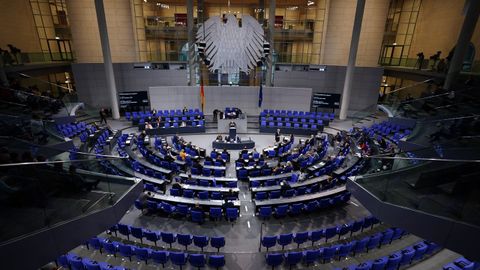
Berlin Bundestag, file photo. CLEMENS BILAN | EFE
This harms the social-Christians of Bavaria and the left
Bundestag, the German federal parliamentapproved the controversial this Friday reform of the electoral law with the aim of reducing the mandate, which in this convocation reached a historical maximum with 736 deputies, 138 more than the law allows. He imposed the reform tripartite government which consists of the Social Democrats (SPD), Greens and Liberals (FDP), who did not reach a previous agreement with the conservative opposition Christian Democrats (CDU) and Bavarian Christian Socials (CSU), especially due to the opposition of the latter, who would be harmed by the new system. The change in the law is also a serious blow to the Left party, which could end up being expelled from the German legislature.
The reform is about “cheerfully questioning the CSU’s right to exist”, which will be “structurally damaged” along with the left, said Alexander Dobrindt, the parliamentary leader of the Bavarian conservative party, in a heated debate before the vote, in which he accused the SPD , Greens and FDP that with this move they are “trying to cement their power”. Jan Korte from La Izquierde accused the troika of trying to wipe off the political map the creation that represents the interests of many Germans in the east of the country and of leaving that territory “today and here in the hands” of the ultra-nationalist Alternative for Germany.
Gordian knot
Various members of the Social Democrats, Greens and Liberals recalled that the House spent ten years “trying to break the Gordian knot of electoral law reform” and confirmed that its commitment to reducing parliament was “necessary and fair” and that it represented the will of the citizens.
Without reform, the Bundestag threatens to continue to grow disproportionately and generously exceed 800 seats after future general elections. The reform established that the House will have 598 MPs from the next election. This will be possible by changing the value of the two votes that each citizen casts in parliamentary elections, the first for choosing a direct candidate, and the second for supporting a certain party. Until now, whoever won the most votes in the first ballot in the constituency went directly to the Bundestag. And if, according to the second round, the party received more direct mandates than parliamentary seats, the deputies elected by the first party still entered the Chamber. In order not to undermine the parliamentary majority, the other parties were compensated with additional mandates. All those “tip” seats are gone now.
Source: La Vozde Galicia
I am Amelia James, a passionate journalist with a deep-rooted interest in current affairs. I have more than five years of experience in the media industry, working both as an author and editor for 24 Instant News. My main focus lies in international news, particularly regional conflicts and political issues around the world.







